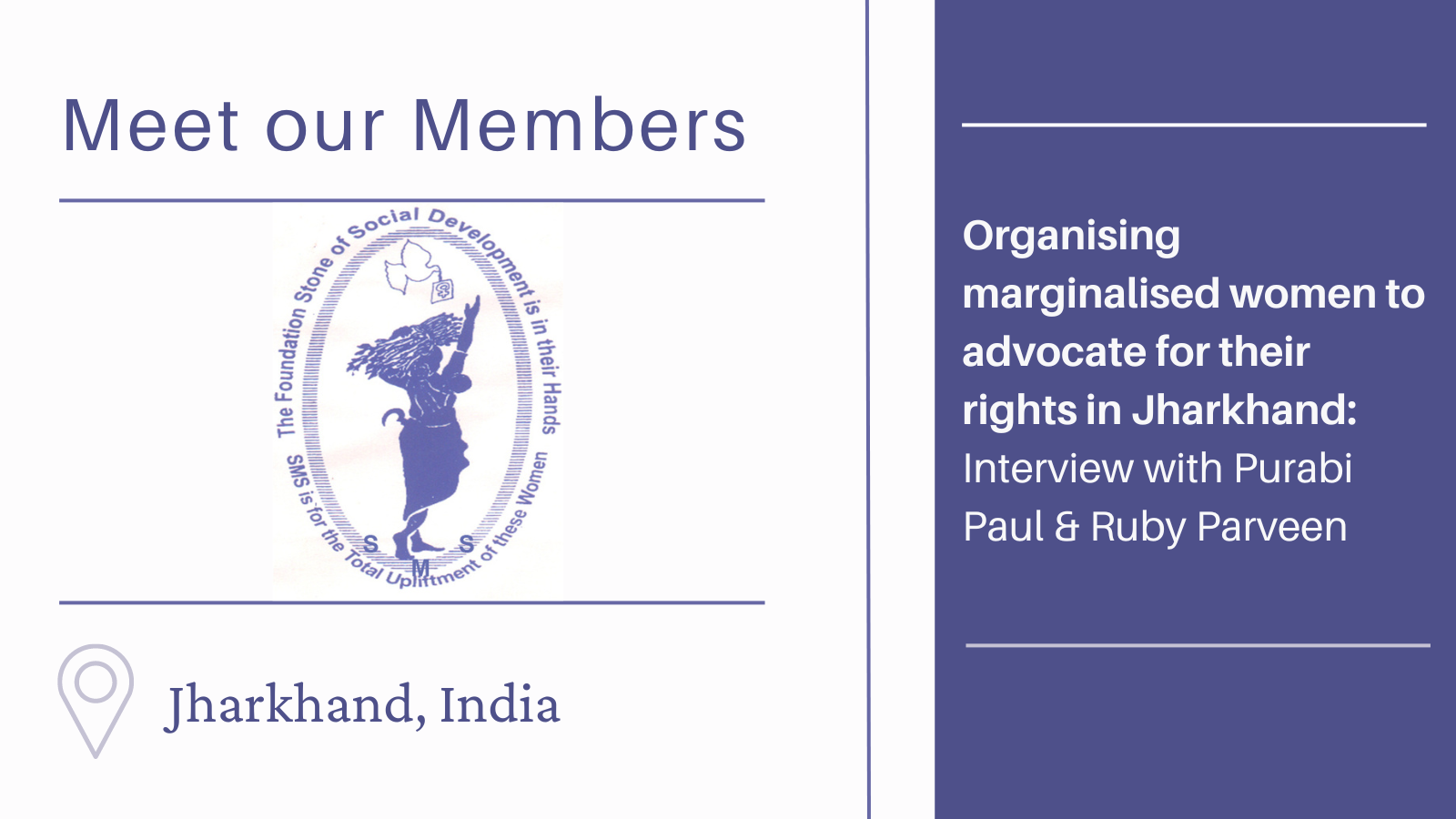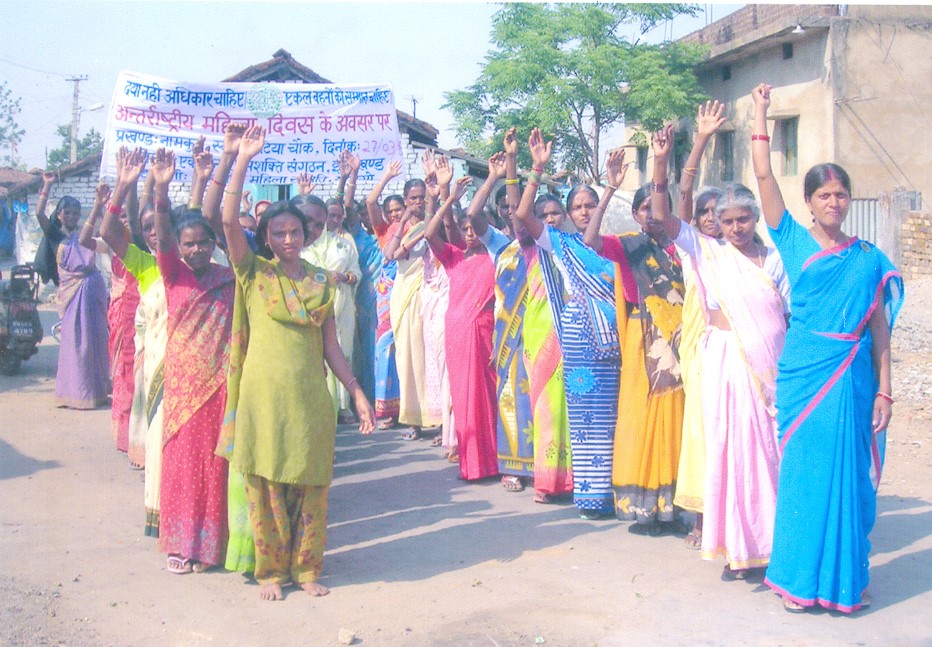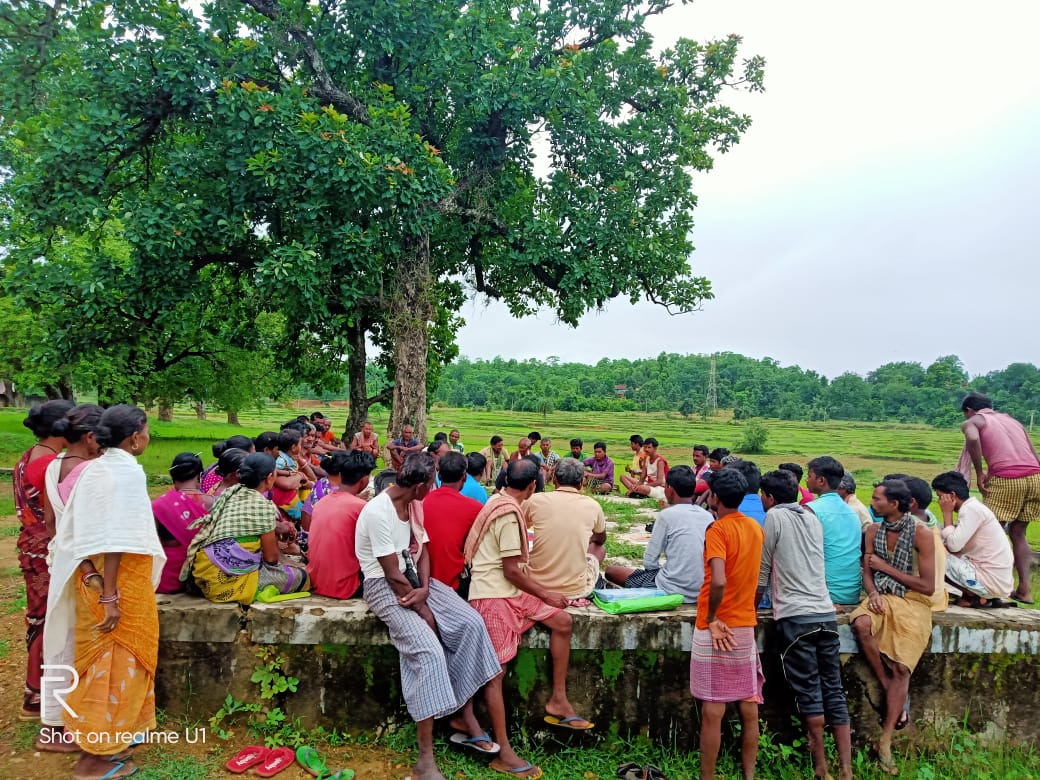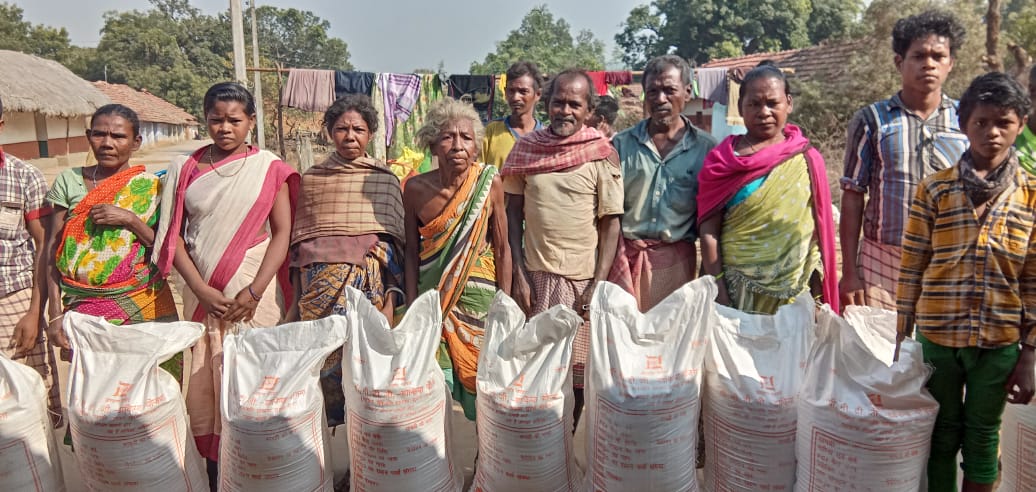
Shramajivi Mahila Samity is a member of GAATW in Jharkhand, a state in eastern India. It focusses on social and economic empowerment of rural and marginalised women. In November 2022, GAATW spoke with Purabi Paul and Ruby Parveen from SMS to learn about the organisation’s work and vision. The interview was conducted by Sumati Panikkar in Hindi and translated by her into English.
GAATW: When was SMS founded and what was the vision it started with?
Purabi Paul: The organisation is called Shramajivi Mahila Samity, which translates into English as ‘women workers’ organisation’. When it was established, it was a women’s group working at the community level with women working on farms and in the construction sector. This was back in 1995, when there were very few women’s organisations. One aim was to promote women’s rights and organise local women. Our focus was on tribal and marginalised women, as this is a tribal area. At that time Jharkhand was not a separate state, it was part of the state of Bihar. The rights of the native community to natural resources were being violated. And this was raised by the tribal movement – they demanded rights over land, forest, and water and rights for people displaced because of mining. This is why the new state was created. And naturally, the organisations of the region at that time were also motivated by this purpose of demanding rights over natural resources to indigenous people, which in turn is linked to the culture and livelihood of the people, and the question of stopping displacement caused by industries and mines. We also started with this vision. But our focus was on organising women for their rights.
GAATW: Which issues do you work on now, and what are the main communities you work in?
PP: Out focus is still on two things: women and vulnerable groups. When we started, our belief was to promote women from the grassroots so that more and more such women can join the development sector. They can understand development and talk about true development while working in their regions. Our aim was to promote them in a sustained way through capacity building, funding, and organisation development. We worked on this from 1995 to 2002. We promoted 21 grassroots women’s organisations in that period. They became registered organisations and have been working in their areas. From 2002 to 2005, we worked on the question of natural resources, governance and women’s political participation. The Panchayati Raj system (a system of local self-government bodies at the village level) was introduced at that time. So, we wanted women to understand politics, the political situation, and their political rights so that they can become part of governance. We did a lot of trainings on these. Jharkhand was formed in the year 2000. That caused another challenge for us. We had the medium of Panchayati Raj at the grassroots to talk about development issues. We also had the PESA law, the Panchayats (Extension to Scheduled Areas) Act, 1996, which ensures the extension of local self-governance Panchayat bodies in tribal areas. It gave ground to establish the system of customary tribal laws. We worked on getting this implemented and getting women ready for the panchayat election and work on development issues through that. If women enter the leadership levels, it is natural that the planning and strategy will be pro-women. That is the belief we worked with. We also prepared a document with the government, on training elected representatives to work on development issues at the grassroots level.
Later on, we realised that we need to work with women who have not yet been brought to the forefront. So we started to work with the group of single women, who we considered as the most vulnerable group at that time.
GAATW: By single women, do you mean women who are unmarried or those who are widowed?
 |
| Women from Ekal Nari Shakti Sangathan (ENSS)/Strong Single Women Forum. |
PP: The belief earlier was that only widowed women are single. But we broadened the definition of single women to include not just widowed women but also destitute and abandoned women, old unmarried women, or unmarried women with children. Then, there are also HIV-affected women, women whose husbands are imprisoned or have left them… We formed a big organisation of single women with 40,000 members, called Ekal Nari Shakti Sangathan (ENSS) or Strong Single Women Forum. It was to bring single women to the front, to do advocacy for government to bring policies for them, and give them recognition, and quotas for their children in education. We were demanding their inclusion in the schemes, policies and government committees. Currently, we are looking at the situation and impact of Covid-19 on them. We want to see if the organisation was able to deal with Covid or if it pushed them back to the situation they were in earlier. The most vulnerable are precisely those women whose children end up as child labourers or migrate to big cities to work as domestic worker or become victims of trafficking. We noticed that the children of single women are more vulnerable to trafficking or child labour. It becomes easier for them to get caught in this trap. So we started working on the issue of migration. Jharkhand is a source area of migrant labour, just like Chhattisgarh and Odisha. The destination areas used to be big cities like Delhi and Mumbai, but now people go all over India, even as far as Ladakh, Goa or Arunachal Pradesh. Earlier, they were going mostly to places where there was a specific demand for domestic workers especially for underage and young girls. There were so many incidents we heard of where they disappeared, never returned, lost contact, or returned after facing abuse.
The government didn’t have any plans or policies for the rescue or rehabilitation of victims. The Labour Department is also mostly concerned with the organised sector. So we felt the need to work on this. We worked to demand a policy for registration of migrant workers, tracking of the companies or workplaces where the workers go. It was a long process. We worked with lawyers and other CSOs, asking the government to be responsible for this. In 2015, the Labour Department brought out an order which stated that they will register the names of migrant workers and help their families. It was the first time for such a step. Our work was to strengthen the communities to deal with this issue. It is a given that people will migrate to other places for work. But if local government bodies are strengthened, they can play a better role by monitoring with methods like maintaining a register of migrants from their village. Those who need money, will migrate anyway. We have to be better prepared for the migration process and be vigilant.
In 2019, we visited a village where there were no adolescent girls to be seen. When we asked about it, no one wanted to answer. Then we found that most girls aged 12 to 22 have migrated to other places to work. Their families don’t talk about it as they fear they’ll be stopped from sending their underage children for work. We tried to say that they shouldn’t send their children until 18 years of age and after that they should do it with the required documentation. We worked with GAATW on this issue and focused mostly on awareness on safe migration.
Another issue we worked on was female foeticide and imbalance in the sex ratio. There was a time in Jharkhand when the ratio of women was higher than men. Then gradually the ratio got deteriorated and the number of women kept decreasing, especially in non-tribal areas. We worked on this issue for 4 to 5 years. Now there are a lot of laws in place. SMs is now a part of the state’s Inspection and Monitoring committee.
 |
| Single wonen showing their land deeds as received from the government. |
We also work on the issue of forest rights. In Simdega, we worked in around 6 blocks (912 hamlets and 162 villages) to make forest committees that work on forest management, forest protection and enhancement, along with livelihood issues. The work we do with GAATW is also related to the same.
Apart from this, we are part of NAWO (National Alliance of Women), who prepares the CEDAW shadow report on the violence and discrimination against women in India. With NAWO, we work with a specific focus on unorganised sector women workers, students in schools and colleges. With Jagori, we work on rural safety for women, advocating with the panchayats for this.
GAATW: That is a vast spectrum of activities that you do. What challenges do you face in doing this work?
PP: The biggest challenge is that India is a very patriarchal society. The mindset of people - not just in the community but also in government institutions, policymakers, lawyers, magistrates - is rooted in patriarchal beliefs. We spend a lot of time making them understand and see the issues from a different perspective.
In the last five years, there is talk of engaging with men to work on gender issues. This engagement is easier with the youth. Youth have a more open mind, if we train them and they are able to understand. But it is very difficult to change the ways of thinking of the older generation in administration and politics. When will we move towards a more equal society? That is our main challenge. Whether we talk about the daily wages at the village level or a policy at a higher level, this is always a question. When authorities prepare budgets and we ask them what their gender-responsive programme is, they think that to distribute some goods to women is women’s development. We lose a lot of time explaining issues to policymakers and administration, even more than the community.
The stark inequality in India is also a big challenge. There are people who are ultra-rich and there are the majority who are ultra-poor. The poor face discrimination at all levels. It’s difficult to organise them because they’re very scattered. They are intentionally kept scattered so that they don’t organise. In rural communities, we see even today that there are some invisible taboos against its own members, like those who migrate to other areas for work, or against widows. These kinds of discrimination cannot be removed by laws. It can only happen at the social level. Those who face discrimination and exploitation have to fight it themselves, they have to be organised. To organise them is a big challenge for us. Our projects are short-term, not much can be achieved in two or three years. This is a problem for NGOs. We should take up issues for a longer period like 5 to 10 years, so that we can begin a process of effective change. Running projects is not difficult, bringing about a change is the challenge. People say that we should have a milestone-based perspective for change. I don’t think change happens in that way. Change happens only when people accept that change and adopt it, and when there is ownership. It’s not about ticking off boxes. Covid-19 has pulled us back to square one and negated whatever changes had been achieved.
GAATW: You were saying that oppressed people need to be at the forefront. How do you ensure that the voices of these people are incorporated in your work?
 |
| Gram Sabha meeting on village development plan |
PP: This is a good question. When we talk about the rights of domestic workers, it should be done by an organisation of domestic workers themselves. For example, we worked on the issue of single women from 2005 to 2016. It took us 11 years because it was a question of institutional building, that is enabling an organisation and creating leadership within that community. We have to encourage members who can articulate their experiences and demands at official levels and with policymakers. There are many ways to do this, and it’s not necessary that the same tool will work everywhere. We have to adapt it according to the situation.
The process for that is to create leadership within that group. You have to create an inclusive and supportive system so that people from the community can enter it and speak with the authorities. Most people who migrate for work don’t have their entitlements, such as ration cards and job cards. We try to get these entitlements for people which helps to build their trust. After that, when they start coming to our meetings, we begin to orient them. The migrants face so many insecurities and risks, we address those and provide a system of solidarity and support. These are some of our techniques.
But the methods used for different groups will not be the same.
GAATW: What was the impact of Covid-19 on your work and the communities you work with?
Ruby Parveen: We did a survey to assess the impact of Covid on women. We wanted to understand the conditions of women in Sonwa Block, where our work has been going on for many years. We found that the women from the villages who used to migrate for work have been impacted. Adolescent girls, 14 to 18 years old, also migrate in large numbers as do women between 20 and 65 years. Some migrate with families, some go with the contractors or middlemen, and some even migrate alone. The migration takes place primarily to Maharashtra, West Bengal, Orissa, Tamil Nadu to work in garment factories, construction work and domestic work. Some educated girls have migrated for nursing jobs as well.
 |
| Food distribution to vulnerable groups during COVID-19 |
GAATW: And what was Covid’s impact?
Ruby Parveen: Many people returned when their factories and workplaces closed during Covid. There were workers who did not get paid, some who walked back all the way, there were pregnant women and people with children who walked all the way. We are trying to organise them now and get them to articulate their demands, create awareness about the documents they need when they migrate for work. We are trying to prepare some of the women for this. Some have begun leading mahila sabha (women’s assemblies) on their own, passing resolutions about women’s safety and rights.
GAATW: These were all the questions I had. Do you want to add anything ese?
PP: India is such a big country, that we feel changing policies at the national and international level is very difficult. As a small organisation, we can make some impact at the state or province level, but we see that in recent years, the state-level policies don’t have the same importance. The central government decide everything. Jharkhand is a small state and doesn’t have much economic power like other states. Secondly, while we encourage people to fight and participate as a civil society organisation, the system is such that it constrains people and makes that road endless. For example, we ask people to educate their children, but the fact is that the education system is in shambles and there is no ray of hope in it for rural children from marginalised communities. Are they able to make a better life with education or does it keep them in the same situation that their parents were in? How many lives are we able to make better is a big dilemma for us. The political system restricts us. Are we able to achieve what we started out to in this field? These are the questions in our mind.
GAATW: It is a long battle. Thank you for sharing your experiences with us.
